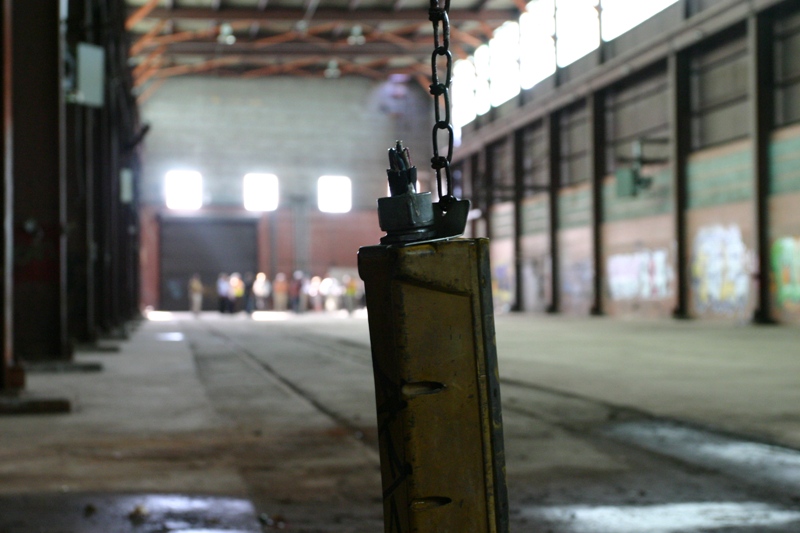Rail riders will have a new station to look forward to after City Councilors Tuesday unanimously agreed to use an old warehouse in downtown Raleigh as a new train station.
The old Dillon Supply Viaduct Building is just one piece of the puzzle to complete Raleigh’s Union Station, a multi-block, multimodal station to serve as a hub for rail, bus and pedestrian transit.
The Viaduct Building, and other Dillon buildings on the west side of downtown Raleigh, were purchased by Triangle Transit in anticipation of a slow-coming transit overhaul.
Located within the Boylan Wye — a triangular area where multiple train tracks come together — the new station would include increased parking, a large passenger waiting area and an elevated platform. All of which will be a far cry from the cramped Amtrak quarters on West Cabarrus Street. The warehouse’s location makes it a great spot for commuter, light and high-speed rail without interfering with the freight lines.

Although the Council endorsed the building, there are still many steps before construction can begin. The state Department of Transportation must complete an environmental impact study on the area before applying for funding, which would come mostly from federal sources.
There are also some connection and parking challenges that staff must overcome.
The city would kick in $3 million toward the bill, which is estimated to be anywhere from $25 million to $35 million. The city’s contribution was part of the transit bond approved by voters in October.
While plans for light, commuter and high-speed rail continue to be discussed, the station, if built, would be the new home for Amtrak, which is operating out of a station that city staff say is too small for the increasing amount of riders. About 165,000 passengers rode the Charlotte-Raleigh train in 2010.
Technology and Communications Committee Gets First Assignment
The newly formed Technology and Communications Committee has its first assignment for 2012. Members will be reviewing the contracts for new E-Procurement software, which is a computer application that would give the city access to a vast array of goods and services. The E-Procurement application would work in the same way that residents use Amazon.com for products and services.
The application would run in concert with the city’s financial program, known as the enterprise resource planning system. Because the program is cost directed, it will help the city manage spending and contract compliance.
SciQuest will be providing the software for a 5-year contract at an annual cost of $243,950, but the initial cost of the program will be $533,225.
SkyBridge Global will be providing the interfaces that will make the program compatible with the city’s current ERP system for $193,000.
The committee meets on the second and fourth Tuesday of the month at 5 p.m.
Downtown Loan Program Expansion
The boundaries of the Downtown Loan Pool Program, which currently only involves businesses along Fayetteville Street, will be significantly expanded. The program focuses private investment in the area, by providing loans to small business owners.
Fayetteville Street became the primary area for the program because of past revitalization efforts by the city.
The Downtown Raleigh Alliance recommended the city expand the program to include areas where there are possibilities for more street-level retail. Using the 2030 Comprehensive Plan, the group recommended the use of Primary and Secondary Retail Streets for the boundary.
In September, the city approved a $50,000 loan to HL Empire to retrofit one of its properties on East Hargett Street. HL Empire will be leasing the property to Forsaken Media, which produces software applications for games on smart phones and other devices.

Progress Energy Center Fees Increased
Organizations planning on using the Progress Energy Center for the Performing Arts will see a rate increase for everything from the use of staff to cocktail tables.
Staff studied current fees and found that they were below market rate and did not always cover the cost of services.
The new rates will go take effect on July 1. To lessen the cost burden on community groups, staff will review the rates annually. Rates for labor, equipment and services at the Progress Energy Center will be increased by 3 percent to the nearest quarter dollar.
There are no changes to similar fees for the Raleigh Convention Center or Raleigh Amphitheater.
A Horse is a Horse, of Course
The mounted unit of the Raleigh Police Department has a new four-legged officer. The 7-year-old horse was donated by Martha Burke.

Mounted Police cross Dawson Street. Photo by Karen Tam.
The RPD Mounted Unit has about five horses, which were donated by residents. When the horses retire at about age 25, they can return to the original owner or be kept by the officer who worked with the animal the longest.
Before the new horse hits the streets, he will undergo some training to deal with common city sounds, like fireworks, leaf blowers and sirens. While officers regularly use the horses to patrol the city, the mounted unit is most often used during large events.
